2018年高考英语语法复习精讲三(动词时态和语态)
- 格式:pdf
- 大小:151.84 KB
- 文档页数:4
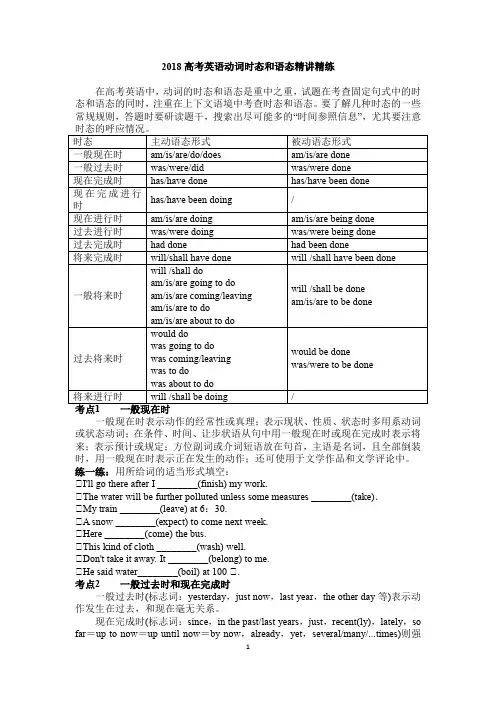
2018高考英语动词时态和语态精讲精练在高考英语中,动词的时态和语态是重中之重,试题在考查固定句式中的时态和语态的同时,注重在上下文语境中考查时态和语态。
要了解几种时态的一些常规规则,答题时要研读题干,搜索出尽可能多的“时间参照信息”,尤其要注意一般现在时表示动作的经常性或真理;表示现状、性质、状态时多用系动词或状态动词;在条件、时间、让步状语从句中用一般现在时或现在完成时表示将来;表示预计或规定;方位副词或介词短语放在句首,主语是名词,且全部倒装时,用一般现在时表示正在发生的动作;还可使用于文学作品和文学评论中。
练一练:用所给词的适当形式填空:①I'll go there after I ________(finish) my work.②The water will be further polluted unless some measures ________(take).③My train ________(leave) at 6:30.④A snow ________(expect) to come next week.⑤Here ________(come) the bus.⑥This kind of cloth ________(wash) well.⑦Don't take it away. It ________(belong) to me.⑧He said water________(boil) at 100 ℃.考点2一般过去时和现在完成时一般过去时(标志词:yesterday,just now,last year,the other day等)表示动作发生在过去,和现在毫无关系。
现在完成时(标志词:since,in the past/last years,just,recent(ly),lately,so far=up to now=up until now=by now,already,yet,several/many/...times)则强调的是对现在的影响和结果,动作到现在刚完成或还在继续。
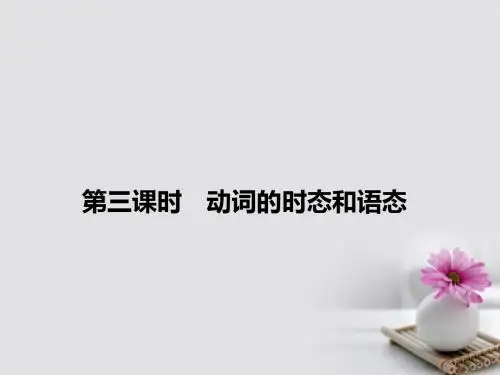


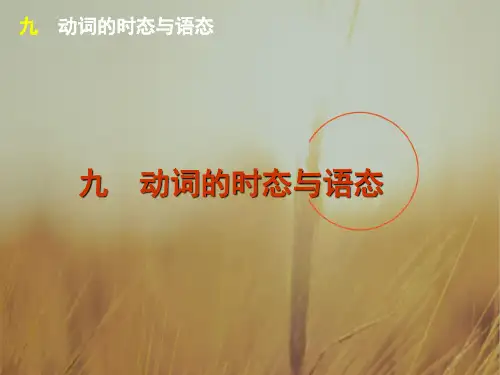
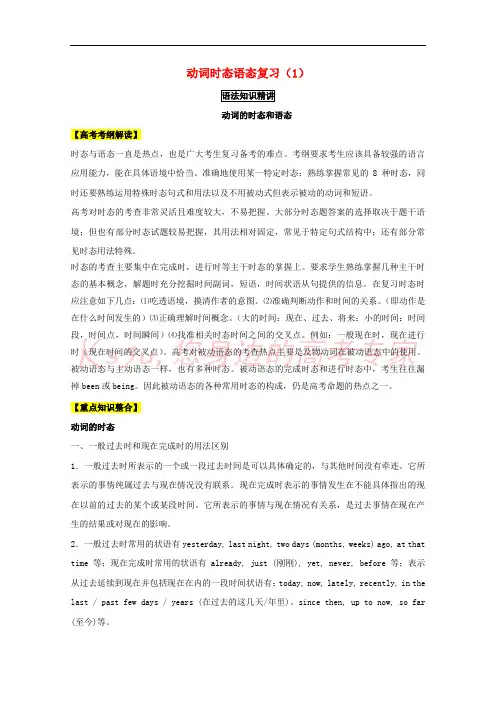
动词时态语态复习(1)动词的时态和语态【高考考纲解读】时态与语态一直是热点,也是广大考生复习备考的难点。
考纲要求考生应该具备较强的语言应用能力,能在具体语境中恰当、准确地使用某一特定时态;熟练掌握常见的8种时态,同时还要熟练运用特殊时态句式和用法以及不用被动式但表示被动的动词和短语。
高考对时态的考查非常灵活且难度较大,不易把握。
大部分时态题答案的选择取决于题干语境;但也有部分时态试题较易把握,其用法相对固定,常见于特定句式结构中;还有部分常见时态用法特殊。
时态的考查主要集中在完成时,进行时等主干时态的掌握上。
要求学生熟练掌握几种主干时态的基本概念,解题时充分挖掘时间副词,短语,时间状语从句提供的信息。
在复习时态时应注意如下几点:⑴吃透语境,摸清作者的意图。
⑵准确判断动作和时间的关系。
(即动作是在什么时间发生的)⑶正确理解时间概念。
(大的时间:现在、过去、将来;小的时间:时间段,时间点,时间瞬间)⑷找准相关时态时间之间的交叉点。
例如:一般现在时,现在进行时(现在时间的交叉点)。
高考对被动语态的考查热点主要是及物动词在被动语态中的使用。
被动语态与主动语态一样,也有多种时态。
被动语态的完成时态和进行时态中,考生往往漏掉been或being。
因此被动语态的各种常用时态的构成,仍是高考命题的热点之一。
【重点知识整合】动词的时态一、一般过去时和现在完成时的用法区别1.一般过去时所表示的一个或一段过去时间是可以具体确定的,与其他时间没有牵连。
它所表示的事情纯属过去与现在情况没有联系。
现在完成时表示的事情发生在不能具体指出的现在以前的过去的某个或某段时间。
它所表示的事情与现在情况有关系,是过去事情在现在产生的结果或对现在的影响。
2.一般过去时常用的状语有yesterday, last night, two days (months, weeks) ago, at that time 等;现在完成时常用的状语有already, just (刚刚), yet, never, before 等;表示从过去延续到现在并包括现在在内的一段时间状语有:today, now, lately, recently, in the last / past few days / years (在过去的这几天/年里)。
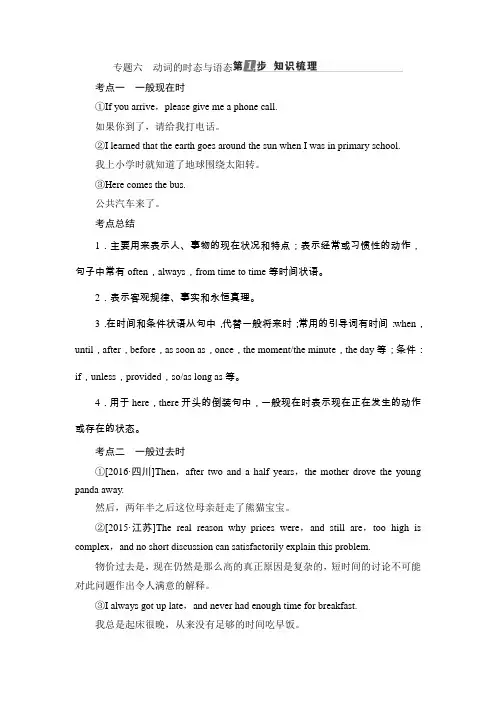
专题六动词的时态与语态考点一一般现在时①If you arrive,please give me a phone call.如果你到了,请给我打电话。
②I learned that the earth goes around the sun when I was in primary school.我上小学时就知道了地球围绕太阳转。
③Here comes the bus.公共汽车来了。
考点总结1.主要用来表示人、事物的现在状况和特点;表示经常或习惯性的动作,句子中常有often,always,from time to time等时间状语。
2.表示客观规律、事实和永恒真理。
3.在时间和条件状语从句中,代替一般将来时;常用的引导词有时间:when,until,after,before,as soon as,once,the moment/the minute,the day等;条件:if,unless,provided,so/as long as等。
4.用于here,there开头的倒装句中,一般现在时表示现在正在发生的动作或存在的状态。
考点二一般过去时①[2016·四川]Then,after two and a half years,the mother drove the young panda away.然后,两年半之后这位母亲赶走了熊猫宝宝。
②[2015·江苏]The real reason why prices were,and still are,too high is complex,and no short discussion can satisfactorily explain this problem.物价过去是,现在仍然是那么高的真正原因是复杂的,短时间的讨论不可能对此问题作出令人满意的解释。
③I always got up late,and never had enough time for breakfast.我总是起床很晚,从来没有足够的时间吃早饭。
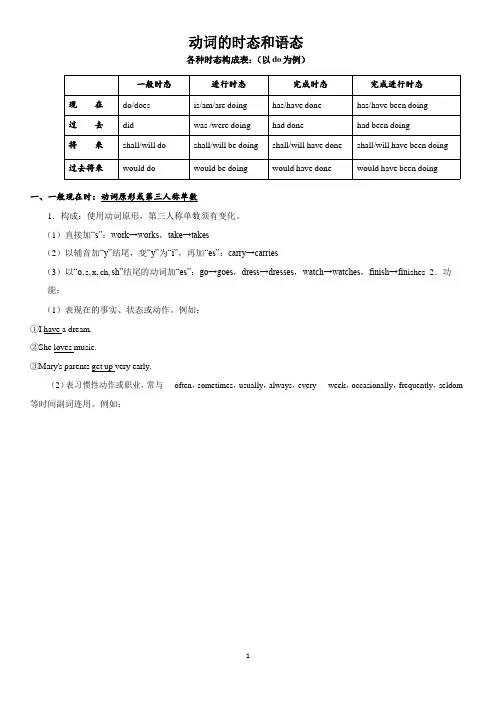
动词的时态和语态各种时态构成表:(以do 为例)一般时态进行时态完成时态完成进行时态现在do/does is/am/are doing has/have done has/have been doing过去did was /were doing had done had been doing将来shall/will do shall/will be doing shall/will have done shall/will have been doing过去将来would do would be doing would have done would have been doing一、一般现在时:动词原形或第三人称单数1.构成:使用动词原形,第三人称单数须有变化。
(1)直接加“s”:work→works,take→takes(2)以辅音加“y”结尾,变“y”为“i”,再加“es”:carry→carries(3)以“o, s, x, ch, sh”结尾的动词加“es”:go→goes,dress→dresses,watch→watches,finish→fin ishes2.功能:(1)表现在的事实、状态或动作。
例如:①I have a dream.②She loves music.③Mary's parents get up very early.(2)表习惯性动作或职业,常与often,sometimes,usually,always,every week,occasionally,frequently,seldom 等时间副词连用。
例如:①I always take a walk after supper.②She writes to me very often.③She is an English teacher.(3)表客观真理,格言警句或事实。
例如:①The earth moves around the sun.②The sun rises in the east and sets in the west.③Two and two makes four.④No man but errs.(4)表示将来发生的动作:A.在由when,after, before,as,as soon as,although,because,if,even if,in case,till,until,unless,as long as,where,whatever,wherever 等引导的状语从句中用一般现在时表将来发生的动作。
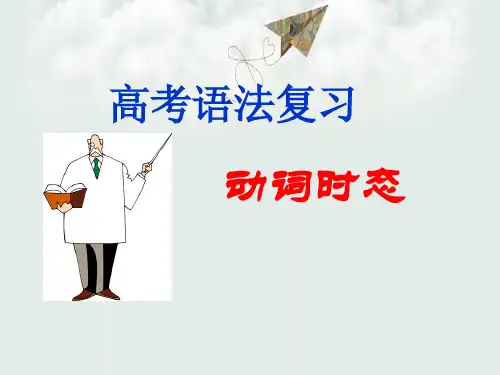

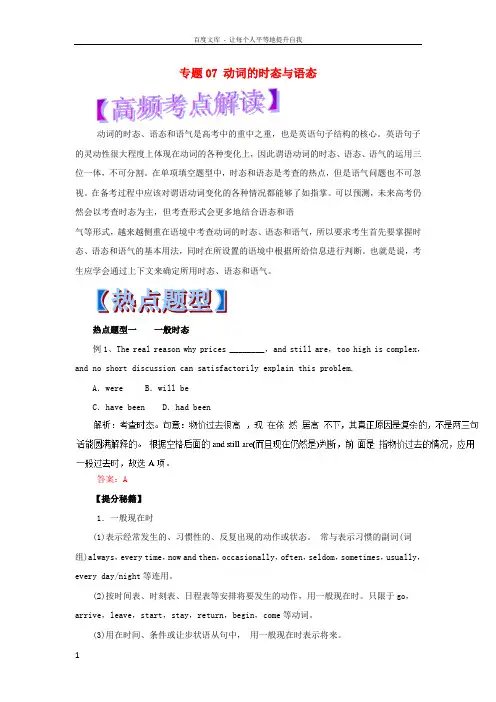
专题07 动词的时态与语态动词的时态、语态和语气是高考中的重中之重,也是英语句子结构的核心。
英语句子的灵动性很大程度上体现在动词的各种变化上,因此谓语动词的时态、语态、语气的运用三位一体,不可分割。
在单项填空题型中,时态和语态是考查的热点,但是语气问题也不可忽视。
在备考过程中应该对谓语动词变化的各种情况都能够了如指掌。
可以预测,未来高考仍然会以考查时态为主,但考查形式会更多地结合语态和语气等形式,越来越侧重在语境中考查动词的时态、语态和语气,所以要求考生首先要掌握时态、语态和语气的基本用法,同时在所设置的语境中根据所给信息进行判断。
也就是说,考生应学会通过上下文来确定所用时态、语态和语气。
热点题型一一般时态例1、The real reason why prices ________,and still are,too high is complex,and no short discussion can satisfactorily explain this problem.A.were B.will beC.have been D.had been答案:A【提分秘籍】1.一般现在时(1)表示经常发生的、习惯性的、反复出现的动作或状态。
常与表示习惯的副词(词组)always,every time,now and then,occasionally,often,seldom,sometimes,usually,every day/night等连用。
(2)按时间表、时刻表、日程表等安排将要发生的动作,用一般现在时。
只限于go,arrive,leave,start,stay,return,begin,come等动词。
(3)用在时间、条件或让步状语从句中,用一般现在时表示将来。
Around two o’clock every night,Sue will start talking in her dream.It somewhat bothers us.每天晚上两点左右,苏就说梦话。
时态语态及一般用法谓语组成时间状语特别用法一般此刻时:Be (am, is, are) do always,usually,ev 1) 按火车、汽车、飞机等时辰1) 常常性或习惯性的动作/ does ery time,seldom, 表将要发生的事2) 此刻的特点,状态及能am / is / are done sometimes often, 2) 在时间、条件、方式状语从力now 句中,用一般此刻时取代一3) 广泛真谛 , 格言警语and then, 般未来时。
occasionally 特别句型 :1)Here/Therecomes ourteacher.( 一般此刻时表正发生动作 )2)It is/has been+ 时段+since .一般过去时:be (was, were) yesterday, last表示过去发生的,和此刻did week, an hour无联系的动作或状态或ago, the other习惯动作was/were done day, in 1982, justnow一般未来时:will/shall do next , tomorrow, 1 )一般未来时可用来表示一未来某个时辰(或某段时am/is/are going in+ 时段, from 种偏向或习惯性动作 .间内)未来要发生的动作to do now on, in the eg. Oil will float on water.am/is/are to do future, Whenever he has time, heam/is/ are about to dowill/shall be done would/should be donewas/were going to be done will come.其否认式表示“ 不可以没法”The machine won’ t work.( 机器无法开动)2 )Cf:be going to表示说话前已经作出的主观的打算或计划,或用来表达有某种迹象要发生的事will do 表示讲话时暂时决定的企图,拥有暂时性和有时性be to do 表示商定、计划或职责、义务要求马上发生的动作。
易错点1 一般过去时和现在完成时的混用1.I had hoped to see her off at the station, but I too busy.A. wasB. had beenC. would beD. would have been【错因分析】此题容易误选B 或D,认为前句用了had hoped,这里是表示"我本来希望去车站为她送行的,但是我太忙了",忙是过去的一个事实,而B 是过去完成时,表示过去的过去发生的动作;D 项的"would have been"是虚拟语气,表示对过去事情的假设,意思是"本来会做",均与语境不符,所以此处不能选B 或D。
【试题解析】前一句谓语用的是had hoped,表示的是过去未曾实现的想法或打算,可以译为"本想",而后一句说"我太忙",这是陈述过去的一个事实,所以要用一般过去时。
【参考答案】A一般过去时和现在完成时的区别1.一般过去时表示过去某时发生的动作或存在的状态,或者单纯叙述过去的事情,强调动作;现在完成时强调过去的事情对现在的影响。
I was an English teacher in No.1 Middle School for twenty years.(表示在过去一段时间里一直存在的状态,与现在没有联系。
表明现在已不是英语老师了。
)I have been an English teacher in No.1 Middle School for twenty years.(表明截止到现在在第一中学已任教二十年了,与现在有联系。
)2.一般过去时常与具体的时间状语连用,而现在完成时通常与模糊的时间状语连用或无时间状语。
He wrote many plays when he was at college.(有明确的表示过去的时间状语,表示写剧本是他过去做的事情。
)He has written many plays.(没有时间状语,本句表明他是剧作家。
2018届高考英语三轮复习专项指导英语认识语言规律要坚持广泛阅读一、听力测试听力测试命题的趋势,可能会对小对话增加长度。
内容应是在日常生活中及学生熟悉的真实环境中一些对话,如学习、读书、课外活动、运动、上网、乘车、购物、打电话、人际交往等等。
备考听力一定要坚持多听,熟悉英、美人正常的说话速度。
选择有针对性的材料进行泛听,如有些英语原版录音录像等,不在乎听懂多少,熟悉他们日常对话的语速就好。
听力训练不必用整块的时间来进行,要学会听句子以及培养获取信息的能力,不必刻意去听懂每一个字,要对时间、地点、数字这样的词特别敏感。
二、语法填空现在的语法填空命题趋向于把两者结合起来,设题中既有真实的语言环境,又有基本的语法知识、句子结构,着重考查语言能力。
备考中注意以下几个方面:1、语言环境,特别是动词及非谓语动词的时态语态。
2、句子结构,包括疑问句、祈使句、倒装句、强调句、省略句、it的用法等等。
在分析特殊句子有困难时,可把此类句子还原成陈述句加以分析,可收到较好的效果。
3、短语的搭配,如动词与介词、副词的搭配,形容词与介词的搭配等。
4、英语中的一些惯用法以及中外文化差异。
不要孤立地死背单词、短语,更不主张死背字典、语法书,应在经常的阅读中熟悉单词、短语,来扩大知识面,增大词汇量。
三、完形填空完形填空较过去有两点变化。
一是以前的文体多为记叙文,故事性情节多,因而容易理解及掌握,而现在的文章在叙述基础上也有一些议论,表达作者的某些观点及看法。
二是以前的设空偏重语法知识,现在的设空基本不考语法,着重于在同类词中选出与上下文意思最适当的词。
因而,从语法角度看,可能有多项正确选择,但从上下文的意思看,只有一个最佳选择。
快速阅读一遍以了解文章的背景、大意及作者的观点、意图,然后针对选项作第二遍阅读,阅读中有些较容易选择的词先填入空中。
这一遍应把文章的基本内容及联系看懂,第三遍再针对上下文做出其它选项,有时下文中会出现帮助理解上文的信息,甚至会直接出现上文中测试的信息。
2018高考英语动词时态和语态精讲精练在高考英语中,动词的时态和语态是重中之重,试题在考查固定句式中的时态和语态的同时,注重在上下文语境中考查时态和语态。
要了解几种时态的一些常规规则,答题时要研读题干,搜索出尽可能多的“时间参照信息”,尤其要注意时态的呼应情况。
时态主动语态形式被动语态形式一般现在时am/is/are/do/does am/is/are done一般过去时was/were/did was/were done现在完成时has/have done has/have been done现在完成进行时has/have been doing/现在进行时am/is/are doing am/is/are being done过去进行时was/were doing was/were being done过去完成时had done had been done将来完成时will/shall have done will/shall have been done一般将来时will/shall doam/is/are going to doam/is/are coming/leavingam/is/are to doam/is/are about to dowill/shall be doneam/is/are to be done过去将来时would dowas going to dowas coming/leavingwas to dowas about to dowould be donewas/were to be done将来进行时will/shall be doing/考点1一般现在时一般现在时表示动作的经常性或真理;表示现状、性质、状态时多用系动词或状态动词;在条件、时间、让步状语从句中用一般现在时或现在完成时表示将来;表示预计或规定;方位副词或介词短语放在句首,主语是名词,且全部倒装时,用一般现在时表示正在发生的动作;还可使用于文学作品和文学评论中。
练一练:用所给词的适当形式填空:①I'll go there after I________(finish)my work.②The water will be further polluted unless some measures________(take).③My train________(leave)at6:30.④A snow________(expect)to come next week.⑤Here________(come)the bus.⑥This kind of cloth________(wash)well.⑦Don't take it away.It________(belong)to me.⑧He said water________(boil)at100℃.考点2一般过去时和现在完成时一般过去时(标志词:yesterday,just now,last year,the other day等)表示动作发生在过去,和现在毫无关系。
现在完成时(标志词:since,in the past/last years,just,recent(ly),lately,so far=up to now=up until now=by now,already,yet,several/many/...times)则强调的是对现在的影响和结果,动作到现在刚完成或还在继续。
请区别下列几组句子:①He has lived in London for three years.(现在还住在伦敦)He lived in London for three years.(现在不在伦敦了)②It's/has been two years since he smoked.(他不抽烟已两年了)It's/has been two years since he began to smoke.(他抽烟已有两年了)③This is the first/second/...time(that)I have_visited the school.This was the first/second/...time I had_visited the school.④He was writing a book last year.(去年他在写一本书)He wrote a book last year.(去年他写了一本书)⑤I thought he was an American.(我原以为他是美国人)I think he is an American.(我想他是美国人)练一练:用所给词的适当形式填空:①—I haven't seen you for ages.Haven't you graduated from college?—Yes.I________(study)English for four years in Nanjing University.②Where________you________(put)my book?I can't find it anywhere.③Although he has lived with us for years,he________(not leave)us much impression by now.④My brother is an actor.He________(appear)in several films in the past few years.⑤—Li Pin may not come tonight.—But he________(promise)the other day.考点3过去完成时和将来完成时过去完成时表示一件事情发生在过去,而另一件事情先于它发生(即表示“过去的过去”)。
常用的时间状语有:by then,by that time,by the end of,before2000,by the time,hardly/scarcely/rarely...when...和no sooner...than...[注]表示原打算做但未做的几种表达:①I had hoped/expected/meant/intended/...to do...,but...=I hoped/expected/...to have done...,but...=I would like/love to have done...,but...将来完成时表示到将来某一时间,某一动作将会完成,常用的时间状语为“by+将来的某个时间”。
如:They will have completed the project by the end of next year.练一练:用所给词的适当形式填空:①Helen________(leave)her keys in the office so she had to wait until her husband ________(come)home.②I________(hope)to meet Mr.Thompson this morning,but I found nobody left in the room.③By the time he________(return)home,the work had been finished.By the time he returns home,the work____________(finish).④We plan to reach the North Pole in mid-July,and by then we____________(walk) for six weeks.考点4现在进行时,过去进行时,现在完成进行时和将来进行时现在进行时表示现在正在进行的情况,计划、安排要做的事,还可以表示反复出现的动作,往往含有赞赏、厌恶、遗憾等情绪,常与always,continually,constantly 连用;过去进行时表示过去某一刻或一段时间内正在进行的动作,还可以表示过去的将来动作;现在完成进行时表示动作的未完成性和暂时性,还可以表示感情色彩;将来进行时表示将来某个时候或某段时间正在进行的动作。
练一练:用所给词的适当形式填空:①—Have you moved into the new house?—Not yet.The rooms________(paint).②My father_____(fall)while he______(ride)his bicycle and______(hurt)himself.③—Why are her eyes red?—She____________(cry).④He____________(fly)over the Atlantic at this time tomorrow.⑤You________always________(watch)TV.Why not do something more active?⑥—Did you find the missing couple in the mountain yesterday?—No,but we________(try)to get in touch with them ever since.考点5一般将来时注意区别will do,be going to do,be about to do,be doing,be to do:①will do表示事物的固有属性或必然趋势,此外,还表示临时决定;②be going to do表示计划、打算要做某事,还表示根据现在的迹象,对未来进行推断;③be about to do表示立即的将来,因此,不与表示将来的具体时间状语连用;④有些动词如come,go,arrive,leave,begin等,其一般现在时、现在进行时亦可表示按计划或安排将来要发生的动作或状态;⑤be to do表示按计划或安排要做的事,意为“应该;想,打算;注定会”,可以用在if引导的句子里。
练一练:用所给词的适当形式填空:①Ladies and gentlemen,please fasten your safety belt.The plane________(take)off.②Look at the timetable.Flight4026________(take)off at18:20.③If you____________(succeed),you should work hard.④Look at the dark clouds.It____________(rain).⑤—The light is still on.—Sorry.I________(go)and turn it off.考点6get+过去分词“get+过去分词”可以表示被动,此结构比较口语化。